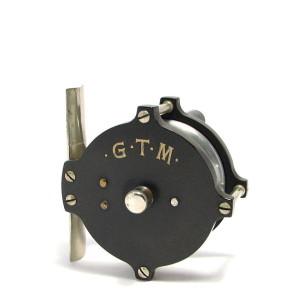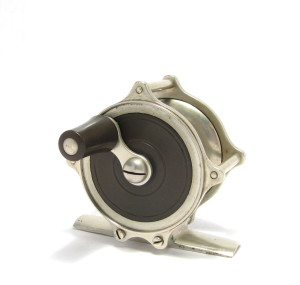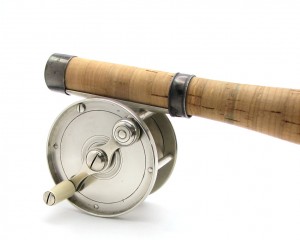Fly Reels
I Collect High-Grade, Vintage Reels, Small In Size And Big On Character. Here Are Some Of My Favorites
~ Click On Pictures To Enlarge ~

The Talbot “Ben Hur” Fly Reel Was Made In Two Sizes: The Model 100 (2-1/8″) And The Model 101 (2-1/2″). This Example Is A Model 100.
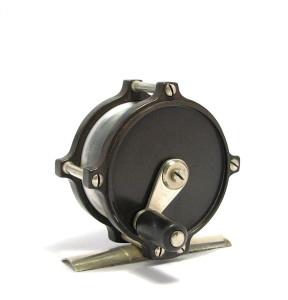
Maker Unknown? I Think So. While Many Attribute These Early William Mills & Son “Fairy” Reels To The Shop Of Julius vom Hofe, Others Disagree.

A Narrow Spool Reel With A Constant Click And Clever Push Button Drag. The Reel Is 2.75″ In Diameter.

Redifor’s Patent 820,326 Is For A “Protected Handle On A Fly Reel”, Which Kept The Line From Fouling

The “Crown” Fly Reel Was Made For William Mills & Son By William Slote Of Brooklyn, NY. The Reel Has A Frame Of Hard Rubber, The Spool And Revolving Plate Are Aluminum And All Other Parts Are German Silver.
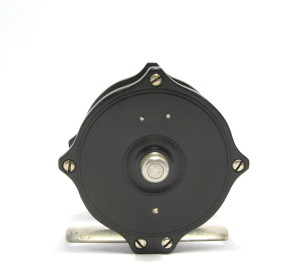
This Example Is A Model 543, Which Is Stamped On The Underside Of The Foot. The Reel Is A Bit Under 2.5″ In Diameter (Including The Pillars) And The Serial Number “24″ Is Stamped Between The Foot Pillars.

George W. Gayle, A Silver Smith And Watch Maker, Apprenticed Under B. F. Meek. There Are Currently Only Eight Known Examples Of This Reel.

This Nickel Silver And Hard Rubber Reel Is Marked “A. B. Shipley & Son, Philadelphia” And Is 2.75″ In Diameter, Including The Pillars

The Reel Has A Pinned Arbor And I Believe Was Made By William Slote[/caption[caption id="attachment_10608" align="aligncenter" width="300"] This Tiny #4 Size Aluminum Fly Reel Is Just 2-1/8″ In Diameter, Including The Pillars
This Tiny #4 Size Aluminum Fly Reel Is Just 2-1/8″ In Diameter, Including The Pillars

Note The Bearing Cap, Which I Have Not Seen Before. Bessie Was Born In Dallas In 1878 And Died In Los Angeles In 1955.

This Nickel Silver Ball Handle Reel Is Just 1-7/8″ In Diameter And Is A Bit Different In Two Respects …First, It Has A Click, Activated By A Rim Switch And …
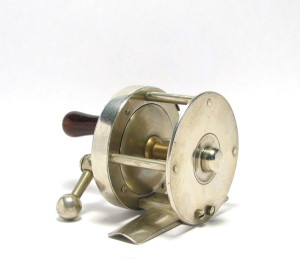
…It Has An Unusually Narrow Spool At Just 1″ Wide. Fishing Photographs From The Mid To Late 1800s Sometimes Show Tiny Ball Handle Reels Such As This One Mounted On Fly Rods.
The Maker Of This Reel Is Unknown.

Francis J. Philbrook Patented What Is Today Referred To As The Leonard “Bi-Metal Reel”. The Patent Number 191,813 Was Filed On May 10, 1877, And Issued On June 12, 1877. The Patent Covered Two New Ideas: The Use Of Raised Pillars And Recessing A Side Plate To House The Click Mechanism.
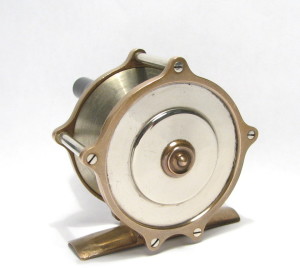
This Example Measures 2-5/8″ In Diameter, Including The Pillars And Is Cataloged As A 2-1/2″ Reel. In The Mid-1880s This Reel Cost $8.50 …Which Was Roughly Two Weeks Average Wages At The Time.
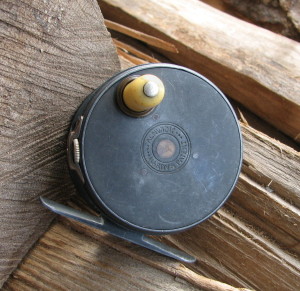
The Hardy “Perfect” Seen Here Is The Smallest Cataloged Size: 2.5″. This Example Has The 1905 Check.

Tackle Historians Hypothesize That Tiny Kentucky Reels, Such As This Narrow Spool Meek & Milam, Were Likely Used As Fly Reels By Some Anglers
~~~~~~~~~~~~~~~~~~~~~~~~~~~~
I Buy Old Tackle ~ Click Here
reelsmith@aol.com
©
All Rights Reserved

The Talbot “Ben Hur” Fly Reel Was Made In Two Sizes: The Model 100 (2-1/8″) And The Model 101 (2-1/2″). This Example Is A Model 100.

Maker Unknown? I Think So. While Many Attribute These Early William Mills & Son “Fairy” Reels To The Shop Of Julius vom Hofe, Others Disagree.

A Narrow Spool Reel With A Constant Click And Clever Push Button Drag. The Reel Is 2.75″ In Diameter.

Redifor’s Patent 820,326 Is For A “Protected Handle On A Fly Reel”, Which Kept The Line From Fouling

The “Crown” Fly Reel Was Made For William Mills & Son By William Slote Of Brooklyn, NY. The Reel Has A Frame Of Hard Rubber, The Spool And Revolving Plate Are Aluminum And All Other Parts Are German Silver.

This Example Is A Model 543, Which Is Stamped On The Underside Of The Foot. The Reel Is A Bit Under 2.5″ In Diameter (Including The Pillars) And The Serial Number “24″ Is Stamped Between The Foot Pillars.

George W. Gayle, A Silver Smith And Watch Maker, Apprenticed Under B. F. Meek. There Are Currently Only Eight Known Examples Of This Reel.

This Nickel Silver And Hard Rubber Reel Is Marked “A. B. Shipley & Son, Philadelphia” And Is 2.75″ In Diameter, Including The Pillars

The Reel Has A Pinned Arbor And I Believe Was Made By William Slote[/caption[caption id="attachment_10608" align="aligncenter" width="300"] This Tiny #4 Size Aluminum Fly Reel Is Just 2-1/8″ In Diameter, Including The Pillars
This Tiny #4 Size Aluminum Fly Reel Is Just 2-1/8″ In Diameter, Including The Pillars

Note The Bearing Cap, Which I Have Not Seen Before. Bessie Was Born In Dallas In 1878 And Died In Los Angeles In 1955.

This Nickel Silver Ball Handle Reel Is Just 1-7/8″ In Diameter And Is A Bit Different In Two Respects …First, It Has A Click, Activated By A Rim Switch And …

…It Has An Unusually Narrow Spool At Just 1″ Wide. Fishing Photographs From The Mid To Late 1800s Sometimes Show Tiny Ball Handle Reels Such As This One Mounted On Fly Rods.
The Maker Of This Reel Is Unknown.

Francis J. Philbrook Patented What Is Today Referred To As The Leonard “Bi-Metal Reel”. The Patent Number 191,813 Was Filed On May 10, 1877, And Issued On June 12, 1877. The Patent Covered Two New Ideas: The Use Of Raised Pillars And Recessing A Side Plate To House The Click Mechanism.

This Example Measures 2-5/8″ In Diameter, Including The Pillars And Is Cataloged As A 2-1/2″ Reel. In The Mid-1880s This Reel Cost $8.50 …Which Was Roughly Two Weeks Average Wages At The Time.

The Hardy “Perfect” Seen Here Is The Smallest Cataloged Size: 2.5″. This Example Has The 1905 Check.

Tackle Historians Hypothesize That Tiny Kentucky Reels, Such As This Narrow Spool Meek & Milam, Were Likely Used As Fly Reels By Some Anglers




